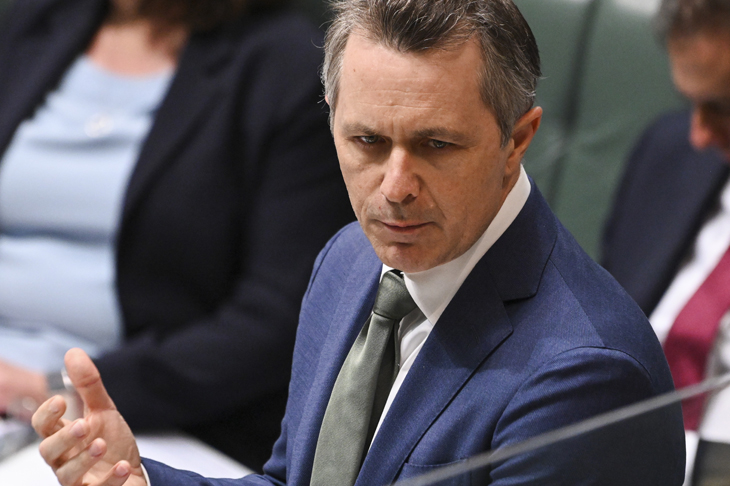Education Minister Jason Clare began well earlier this year when he made it compulsory for universities when training teachers to teach reading, writing and mathematics using evidence-based practices.
However, his foray into the teaching wars has, unsurprisingly, culminated in a series of policies focused on improving equity while seriously compromising academic standards. Worse still, the federal government has turned its back on racial equality by implementing recommendations designed to usher in a new age of identity politics at our universities.
As part of the higher education shake-up, all academically qualified indigenous students will be guaranteed a Commonwealth-funded place at university and the 50 per cent pass rule for students to continue to receive funding will be abolished.
The Minister for Education claims this is ‘not about lowering standards’. However, continuing to fund students who fail more than half their courses will, by definition, do exactly that. Needless to say, the Minister provided no evidence to back up his statement. While nine Australian universities are among the top 100 globally, the Productivity Commission’s five-year inquiry found highly variable and poor-quality teaching was failing students who entered the workplace unequipped to meet real world demands.
Academic standards in Australian universities are already in crisis. Students finish their degrees woke-ready rather than work-ready. Yet the federal government’s response to the interim review into higher education does nothing to arrest this decline. In fact, the removal of the 50 per cent pass rule will further exacerbate falling standards by transferring responsibility for student performance from the student to the university.
The Minister for Education stated, ‘Instead of forcing them to quit, we should be helping them to pass,’ adding that universities will be required ‘to improve support to students who need it and to report on the outcomes for the student following that intervention’. This effectively relieves the student of any obligation to take personal responsibility for their performance.
Under the guise of helping disadvantaged students, the government is now throwing money at universities. While such largesse may benefit minority groups, it ultimately betrays the interests of hardworking Australians who must fund the exercise but derive no benefit from it.
The core purpose of a university is to impart knowledge and to hone the mind through the development, consideration and the contest of ideas. A tertiary education means nothing if universities discourage debate and intellectual challenge. And suppressing freedom of thought has a knock-on effect; the contest of ideas is not only the essence of university life, but the essence of a flourishing liberal democracy.
Instead of pursuing academic excellence and free speech, the federal government seems committed to making our universities a further arm of Australia’s already extensive social welfare program.
While there is merit in implementing policies to help disadvantaged groups and reduce poverty, this should not be done at the expense of tertiary education standards. Perhaps there are far greater returns for governments to be found in funding programs that encourage school attendance rather than boosting university enrolments. Without a secondary education, disadvantaged students will never attain a university qualification.
Embracing affirmative action in university admissions undermines the principle of equality of opportunity. This was the finding of the US Supreme Court which declared in June that race-based preferencing in admissions violated the constitution. US Chief Justice John Roberts said universities had ‘concluded, wrongly, that the touchstone of an individual’s identity is not challenges bested, skills built, or lessons learned but the color of their skin. Our constitutional history does not tolerate that choice.’
Australia is running in the opposite direction, moving to permanently embed identity politics in our university admissions processes.
There is already a widespread and growing tendency for Australian universities to adopt formal ideological positions, contributing to a culture of censorship on campus. Every Australian university has signed up to one or more policies or strategic commitments which pledge their institution to woke ideologies. These generally fall into three categories: indigenous issues, gender inequality, and sustainability. The rise of the ‘social justice university’ signals a new focus on activism over education.
The University Accord reforms as they stand will entrench these woke priorities while exacerbating the fundamental failure of our academic institutions to be places of open learning and intellectual freedom.
Worryingly, the interim review will do nothing to address the erosion of free speech on campus. Forthcoming IPA research shows 90 per cent of Australian universities have policies that are hostile to free speech. The total hostility score across all institutions, as measured by the number and severity of university policies which are hostile to free speech, increased by 117 per cent between 2016 and 2023.
Previous IPA research has shown that the culture of censorship on campus has already been advanced by university policies that purport to protect free speech on campus. In 2020, the federal government introduced a new requirement forcing universities to develop free speech policies based on the French Model Code – a template written by former Australian chief justice Robert French. However, analysis shows only a third adopted the six essential pro-free speech criteria.
A case in point is Newcastle University’s Code for the Protection of Freedom and Academic Freedom, which states, ‘The principles outlined in this Code do not have overriding legal status nor overriding status to the University’s institutional values or strategic commitments.’ Newcastle University’s Strategic Plan 2020-2025 outlines ‘equity’ and ‘sustainability’ as key values, meaning the university could arguably prohibit speech in opposition to the proposed Voice to parliament or views not aligned with the zeitgeist on climate change.
According to Jonathan Haidt, professor of psychology at New York University, a social justice institution cannot also protect free speech. By promoting one side of an issue, universities attach a value judgment to it and suggest it is the superior position to hold. This closes debate and crushes viewpoint diversity.
Affirmative action is antithetical to the principles of individual liberty, equal opportunity and the pursuit of academic excellence – all cornerstones of strong democracies. Excellence in education and equity-based policies are mutually exclusive goals. Pursuing one will always come at the expense of the other.
Got something to add? Join the discussion and comment below.
Get 10 issues for just $10
Subscribe to The Spectator Australia today for the next 10 magazine issues, plus full online access, for just $10.
Brianna McKee is a Research Fellow and the National Manager of Generation Liberty at the Institute of Public Affairs
You might disagree with half of it, but you’ll enjoy reading all of it. Try your first month for free, then just $2 a week for the remainder of your first year.














Comments
Don't miss out
Join the conversation with other Spectator Australia readers. Subscribe to leave a comment.
SUBSCRIBEAlready a subscriber? Log in